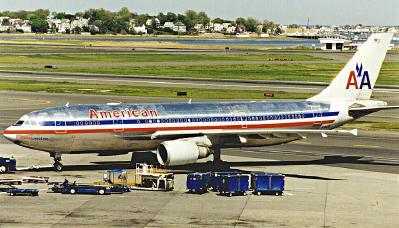AMR Spokesman Says Medical Equipment WAS Working
More details over the crew's handling of a passenger's emergency
medical situation onboard a recent American Airlines flight have
surfaced.

As ANN reported Monday,
Carine Desir died onboard the February 22 flight from
Port-au-Prince, Haiti to New York. Desir's cousin, Antonio Oliver,
who was traveling with her, went public Monday with statements
implying cabin attendants onboard the nearly-full Airbus A300
ignored Desir's inital requests for oxygen, after saying she had
troubles breathing following meal service.
"Don't let me die," Oliver recalled Desir saying, The Associated
Press reported Monday. Early reports also stated two oxygen bottles
the crew brought to Desir were empty, and an onboard medical
defibrillator malfunctioned. The 44-year-old woman -- who was
reportedly a nurse -- later died.
On Monday, officials at American -- as well as the carrier's
flight attendants' union, and one of the doctors who administered
aid to Desir -- defended flight attendants' handling of the
crisis.
Through his attorney, Dr. Joel Shulkin said two emergency
medical technicians onboard the flight performed CPR on Debir, who
initially complained of not feeling well and being very thirsty
after eating her meal.
At first, attendants brought Desir a glass of water, but her
symptoms persisted and she then experienced difficulty breathing.
Oliver flagged down an attendant and asked for the oxygen, telling
attendants Desir was a diabetic.
"The flight attendant responded, 'OK, but we usually don't need
to treat diabetes with oxygen, but let me check anyway and get back
to you,'" said American spokesman Charley Wilson. Desir also
suffered from heart disease.
Oliver maintains a flight attendant denied his requests for O2
twice -- a charge Wilson downplayed, noting the first attendant
spoke with a second, and both returned to Desir within three
minutes. "By that time the situation was worsening, and they
immediately began administering oxygen," he said.
Leslie Mayo, a spokeswoman for the Associated of Professional
Flight Attendants, said cabin personnel don't automatically give
oxygen to every passenger who requests it, but instead use criteria
determined by the carrier. He said two tanks were brought to Desir,
out of 12 emergency O2 tanks onboard the A300 -- and, contrary to
Oliver's claims, all those tanks were fully functional.
"Each tank worked properly. I cannot speculate as to why a
second tank was used," he said.
Dr. Shulkin could not confirm whether the oxygen was flowing,
his attorney said, though American's Wilson emphatically stated "It
was working, and the defibrillator was applied as well."
 Installed in airline cabins over the
past few years, automated external defibrillators (AEDs) deliver an
electric shock to restore normal heart rhythms when a particular
type of irregular heartbeat is detected. The systems do not deliver
a charge if no such beat is detected, however... and Dr. Shulkin
implied such was the case with Desir, though he declined to give
specific details out of deference to Desir's family.
Installed in airline cabins over the
past few years, automated external defibrillators (AEDs) deliver an
electric shock to restore normal heart rhythms when a particular
type of irregular heartbeat is detected. The systems do not deliver
a charge if no such beat is detected, however... and Dr. Shulkin
implied such was the case with Desir, though he declined to give
specific details out of deference to Desir's family.
Ellen Borakove, spokeswoman for the medical examiner's office in
New York, confirmed Desir died from complications due to diabetes
and heart disease.
When informed of Desir's medical condition, the plane's flight
crew at first moved to divert to Miami... but when Desir later
passed, the pilots opted to continue on to JFK International.
Desir's body was laid down in first class and covered with a
blanket, Wilson said. Passengers exited the plane behind the first
class cabin.
"Our crew acted very admirably. They did what they were trained
to do, and the equipment was working," he said.
FAA spokeswoman Alison Duquette said the agency's Federal Air
Surgeon's office will discuss Desir's death with officials at
American.
 ANN's Daily Aero-Term (04.24.24): Runway Lead-in Light System
ANN's Daily Aero-Term (04.24.24): Runway Lead-in Light System ANN's Daily Aero-Linx (04.24.24)
ANN's Daily Aero-Linx (04.24.24) Aero-FAQ: Dave Juwel's Aviation Marketing Stories -- ITBOA BNITBOB
Aero-FAQ: Dave Juwel's Aviation Marketing Stories -- ITBOA BNITBOB Classic Aero-TV: Best Seat in The House -- 'Inside' The AeroShell Aerobatic Team
Classic Aero-TV: Best Seat in The House -- 'Inside' The AeroShell Aerobatic Team Airborne Affordable Flyers 04.18.24: CarbonCub UL, Fisher, Affordable Flyer Expo
Airborne Affordable Flyers 04.18.24: CarbonCub UL, Fisher, Affordable Flyer Expo




